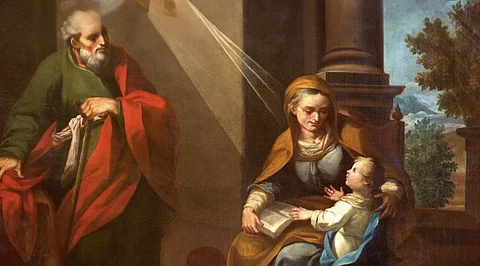
- NEWS
- the EDIT
- COMMENTARY
- BUSINESS
- LIFE
- SHOW
- ACTION
- GLOBAL GOALS
- SNAPS
- DYARYO TIRADA
- MORE

Some notes on Sts. Joachim and Anne
1. There is no mention of Saints Joachim and Anne in the New Testament. But tradition very early hailed Sts. Joachim and Anne as the father and mother of the Mother of God. As they were the grandparents of Jesus, they are the patron saints of grandparents.
2. Early testimonies come from the apocryphal writings: the Protoevangelium or the First Gospel of James (2nd century), the Gospel of the Nativity of the Blessed Mary (3rd century), and Pseudo-Matthew’s Book of the Nativity of the Blessed Virgin Mary and of the Childhood of the Savior.
3. According to these non-canonical sources, Anne (Hebrew, Hannah), was born in Bethlehem in Judaea. She married Joachim and both lived a devout life, but lamented their childlessness. Reproached in the temple because of his childlessness, Joachim retreated to the countryside to pray. Meanwhile, Anne solemnly promised that, if given a child, she would dedicate the child to the Lord’s service.
4. Both Joachim and Anne received the vision of an angel, who announced that Anne would conceive and bear a child. When the child was born, Anne named her Mary. When Mary was three years old, in fulfillment of Anne’s promise, Joachim and Anne brought her to the Temple of Jerusalem, where they left her to be brought up. The account startlingly parallels the Old Testament account of barren Hannah and her conception of Samuel (see 1 Sm. 1). She also dedicated her child to the service of God.
5. According to later legends, Joachim died shortly after Mary’s birth. Another tradition says that Joachim and Anne first lived in Galilee and later settled in Jerusalem. There the Blessed Virgin was born and reared; there also her parents died and were buried.
6. A house was built in the 4th century, possibly by St. Helena, on the site of the house of Sts. Joachim and Anne. Their tombs there were honored until the close of the 9th century, when the church was converted into a Muslim school. In Islam, St. Joachim is called “Imram,” the father of Maryam (see Qur’an, Surah Al Imran), and grandfather of “Isa,” Jesus. The crypt that formerly contained the holy tombs was rediscovered in 1889.
7. Devotion to St. Anne was fervent in the Eastern church as early as the 4th century. But it was not until the 8th century that devotion to her was introduced in Rome. On the other hand, the devotion to St. Joachim developed late in the West. The feast was introduced only in the 15th century. It was added to the General Roman Calendar in 1584. In the 1969 revision of the General Roman Calendar, his feast was added to that of St. Anne.
8. St. James’s Protevangelium became the foundation for establishing the feasts of the Nativity of the Virgin Mary (8 September) and the Immaculate Conception (8 December. The dedication of Mary at the Temple by Sts. James and Anne became so important in Church doctrine that by 1585, Pope Sixtus V established the feast of the Presentation of the Virgin Mary (21 November), although the feast originated early in the East in 543.
Pope Francis remarked on Sts. Joachim and Anne: “Mary grew up in the home of Joachim and Anne; she was surrounded by their love and faith; in their home she learned to listen to the Lord and follow his will.”
9. Prayer: O Lord, God of our Fathers, you bestowed on Sts. Joachim and Anne the singular grace that of them should be born the Mother of your Incarnate Son. Grant, through their prayers, that we may attain the salvation you have promised to your people. This we humbly ask, through Christ, our Lord. Amen.
Prayers, Best wishes, God bless!
